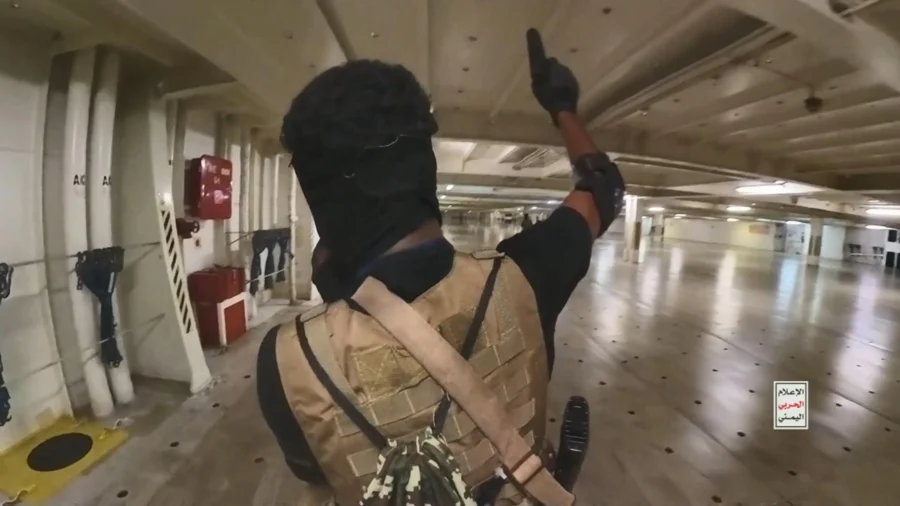The Israeli military may begin targeting Yemen’s Houthi rebels if other members of the international community don’t intervene to stop the Shiite movement from attacking shipping lanes along the Red Sea.
Speaking with Israel’s Channel 12 news on Dec. 9, Israeli National Security Adviser Tzachi Hanegbi discussed the ongoing Israel-Hamas conflict in the Gaza Strip and the possibility of a wider regional conflict.
Focusing on recent Houthi attacks on ships in the Red Sea and the Gulf of Aden, Mr. Hanegbi said Israel might have to act to protect its shipping lanes.
“Israel is giving the world some time to organize in order to prevent this but if there isn’t to be a global arrangement—because it is a global issue—we will act in order to remove this naval siege,” Mr. Hanegbi said, according to a CNN translation of his remarks.
The Houthis, also known as Ansar Allah, are a Zaydi Shiite movement that has intermittently fought with Yemen’s internationally recognized government since 2004. Their conflict expanded after the Houthis forcefully took over the Yemeni capital of Sanaa in September 2014, igniting an ongoing civil war that has seen Saudi Arabia and other Gulf states intervene on behalf of the Yemeni government.
The United States has supported the Saudi-led coalition throughout the conflict, and the U.S. State Department assesses that Iran is supporting the Houthi side.
Israel’s Ports Under Fire
Since the outbreak of fighting between Israel and Hamas on Oct. 7, the Houthis have expressed solidarity with Hamas and have launched drone and missile attacks targeting Israel’s ports.
On Nov. 20, Houthi fighters executed a helicopter-borne assault on the Bahamas-flagged cargo ship, MV Galaxy Leader, hijacking the ship in the Red Sea and taking its 25 crew members hostage.
The captured civilian vessel is partly owned by an Israeli billionaire, and the Houthis said that “all ships belonging to the Israeli enemy or that deal with it will become legitimate targets.”
This past week, three more cargo ships—MV Unity Explorer, MV Number 9, and MV Sophie II—sustained damage from missiles as they transited the Red Sea and the Gulf of Aden. The missiles were reportedly launched from Houthi-controlled areas of nearby Yemen.
The Arleigh-Burke Class destroyer USS Carney responded to the civilian ships’ distress calls and reported downing multiple suspected Houthi drones.
The USS Carney is one of several U.S. warships that have assisted the Combined Maritime Forces, a multinational coalition of naval forces that provides maritime security between the Red Sea, Gulf of Aden, Arabian Sea, and Persian Gulf.
While Combined Maritime Forces participants have responded to distress calls and downed multiple suspicious drones, coalition members have not launched direct retaliatory strikes against the Houthis since the rebel group began attacking merchant ships in recent weeks.
In a Dec. 4 briefing, Deputy Pentagon Press Secretary Sabrine Singh said the U.S. coalition continues to assess the situation around the Red Sea and the Gulf of Aden, but that the Houthis’ actions thus far had not warranted a more direct U.S. response.
In his Saturday interview with Channel 12, Mr. Hanegbi did not elaborate as to what actions Israel is considering taking against the Houthis.
Israel-Hezbollah Fight Could Be Next
While Houthi attacks on shipping lanes may draw Israel’s attention south, Hezbollah is posing new risks to Israel’s north.
Mr. Hanegbi told Channel 12 that once Israeli forces defeat Hamas in the Gaza Strip, they may have to turn their attention to the northern border with Lebanon.
Hezbollah and Israeli forces have skirmished along the Israel-Lebanon border in the weeks since the Hamas attack on Oct. 7, and the government has evacuated numerous Israeli border communities.
Israeli residents may not be safe to return to their homes in the north if Israel takes actions against Hezbollah similar to those it is taking with Hamas, Mr. Hanegbi said.
Israel would welcome a diplomatic solution to prevent a conflict with Hezbollah, but he expressed doubts that such a solution would emerge.
“We can no longer accept [Hezbollah’s] Radwan force sitting on the border,” Mr. Hanegbi told Channel 12.
Mr. Hanegbi said that more must be done to enforce the United Nations Security Council Resolution 1701, adopted in 2006, which calls for Hezbollah to remain north of the Litani River, which runs about 18 miles north of the Israel-Lebanon border.
He said that with the current state of fighting along the border, Israel can’t be certain that Hezbollah forces won’t breach the border and carry out an attack similar to the Oct. 7 Hamas assault, in which Hamas gunmen breached the Israel-Gaza barrier and proceeded to kill hundreds of people.
Israel has communicated to the United States that it doesn’t seek war in the north, Mr. Hanegbi said, but will “impose a new reality” if it deems Hezbollah a continued threat.

